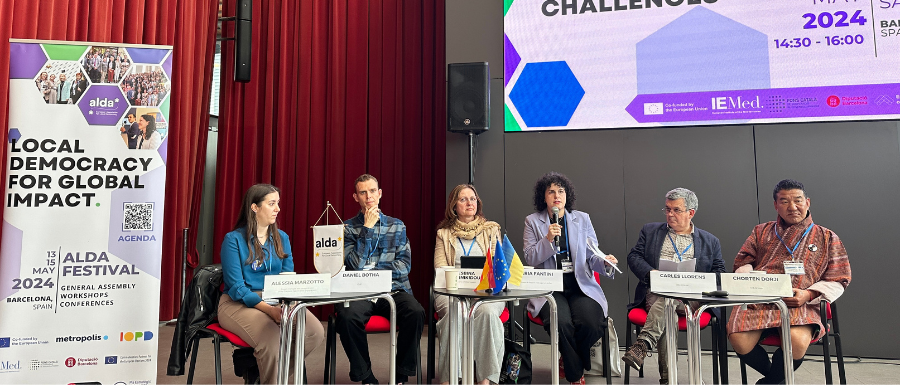Citizens Participation as an essential element to face climate challenges
On May 14th 2024, the Environment & Climate Hub together with the Civic Engagement Hub of ALDA held a panel session during the “Local Democracy for Global Impact” General Assembly in Barcelona, Spain. Taking place from May 13 until 15, 2024, the event was marked by panels, conferences, workshops, and sessions on critical topics like civic participation, environment and climate, gender and inclusion, digitalisation and much more.
The ‘Citizens Participation as an essential element to climate change’ panel aimed to foster the importance of citizen engagement in tackling climate-related challenges, particularly in the context of initiatives like the European Green Deal. The increasing impacts of climate change we are witnessing today highlight the urgency for collective action: in the light of this alarming context, civic participation and local democracy appear to be key elements to create policies and strategies to face climate change effects.
The panel, moderated by Ms Valeria Fantini, Project Manager and Coordinator of the Environment and Climate Hub of ALDA, featured an impressive lineup of speakers: Ms Alessia Marzotto, co-chair of the Civic Engagement Hub of ALDA; Mr Daniel Botha, Expert in Justice, Equity and Democracy at ICLEI; Desbina Kallinikidou from the Municipality of Oberhausen; Mr Carles Llorens, Secretary-General at ORU-FOGAR; and Mr Chorten Dorji, Executive Director at HAB Bhutan.
The event was a great chance to explore, exchange and debate interesting practices on citizens participation
The discussion focused on two main aspects: the first one on sharing best practices, and the second part on how to make these practices more concrete and integrated in policymaking.
ALDA Hub coordinator and moderator Mrs. Valeria Fantini introduced the session sharing some key elements of two relevant projects, of which ALDA is part: SHARED GREEN DEAL Project and the REAL DEAL project. In relation to the latter, Mrs. Alessia Marzotto introduced the ‘Civil Society Forum for Sustainability – Shaping the European Green Deal’ in the context of the European REAL DEAL project, highlighting the importance of creating informal, inclusive, and safe spaces where stakeholders (academia, NGOs, policymakers, citizens) can discuss pressing issues related to the EU Green Deal and express their opinion.
Mr. Daniel Botha, speaking about the Accting Project, stressed the importance of the role of local NGOs in the promotion of citizens’ engagement and the necessity of focusing on their funding and financial resources so that civil society organisations can use them effectively to promote sustainable development.
Mrs. Desbina Kallinikidou pointed out that when discussing climate change and gender issues, the key is to support NGOs because they already work on these topics and are often closer to citizens. In this regard, the Inequalities Matters project, of which she is a member, aims to develop an accessible language in order to build a functioning network on environment and sustainability issues, to take care of public relations and to launch new projects in the field and support existing ones. To carry out their mission, NGOs therefore need support and coordination.
Carles Lloren emphasised the significance of developing processes that provide solutions to problems and thus prove to be effective: in such cases, people will always feel engaged and consequently take part in participatory processes. In support of this idea, he highlighted various participatory cases in different parts of the world, including Ecuador, Catalonia, Basque Country, and Senegal.
Chorten Dorji introduced Bhutan and their own association, discussing the need to cooperate to make our voices heard and thus address the negative effects of climate change.
The panel aroused great interest among the audience, who actively participated during the Q&A session. In particular, Aquí project brought to attention the need to include experts from different fields, both in local and governmental plans, so that we can effectively respond to the imperatives of climate change.
The event was a great chance to explore, exchange and debate interesting practices on citizens participation. It concluded with a call for continued collaboration and innovation in these fields to promote more sustainable and engaging societies.
You can find the photos of the panel here.
